(this article will help you understand what on-page and off-page SEO means and why they are important for your website)
So, you've upped your online game, read our blog on why SEO is important and made the wise decision to optimise your website.
However, you're quickly discovering that the world of Google is more like a kaleidoscope of moving colours than a paint-by-numbers set of easy, straightforward steps.
Acronyms like SERP and SSL/HTTPS can fly off the page and make your brain spin.
Terms like on-page and off-page SEO can sound scary and make you question your decision to look at SEO in the first place.
We get it.
At first glance, this stuff can make you feel like you're studying to become a brain surgeon or build a rocket ship from scratch.
You're probably sitting there thinking,
'I didn't sign up for this!'
or
'I just want to sell my pretty candles, not earn a degree in engineering!'.
While we love our engineers we employ them ourselves and they’re awesome.
Here’s the truth...
You don't need to be a rocket scientist or even an engineer to nail your SEO and dominate Google's search results.
We're here to help you decode the cryptic SEO terms and clarify the vague 'strategies' you've probably read about, starting with on-page SEO and off-page SEO.
Before you throw out your copy of SEO for dummies & revert to early 2000's marketing methods (spoiler alert: they won't work), read on to learn all you need to know about on-page & off-page SEO in practice.
On-Page SEO
The easiest way to understand on-page SEO is to think of it as everything on your own website.
On-page SEO improves your website's position on the search engine results page.
Even if you've just dipped your toe into the world of SEO, you've likely already worked on your on-page SEO strategy - even if you didn't realise it. The first port of call is generally to improve the keywords, page titles and mobile-friendliness, which are all on-page elements.
Good on-page SEO will ensure that search engines understand, index, and crawl the content on your web page.
Additionally, on-page SEO refers to the elements on your web page that ensure it makes sense to your potential customers. Google favours websites that are comfortable to use, mobile-friendly, with a quick load time and high content quality. Nailing these factors will go a long way in making your business online show up in Google search results.
On-Page SEO Tactics That Work:
Content Quality
'Content is King'.
You've probably heard that phrase before - and many marketers live by it for very good reason.
Good quality content is useful, easy to read, unique and relevant.
Not only does high-quality content make your website more interesting and eye-catching than other sites, but it can make Google favour your website in a way that many other factors can't.
Basically, if you've got every SEO tool under the sun, but your content sucks, your search engine rankings will still suffer.
We wrote a great article about quality content called "How To Supercharge Your Website Like The Big Mac Did For McDonalds" it will help you learn what high quality content looks like.
Keywords
Keyword optimisation has been a cornerstone of on-page SEO ever since web pages were a thing. Optimised keywords act as a homing beacon for people searching for web pages just like yours.
By creating your website content around your target market, you'll be attracting all the right people who are more likely to spend, convert and engage with you.
You can learn more about our Keyword Research services here.
Meta Descriptions
Meta descriptions sound technical and scary, but ultimately – they’re more common than you think.
Have you seen those little blurbs underneath the search result that give you a juicy little insight into the website's content?
That's a meta description.
Title Tags
The title tag is the title of a web page, and the main heading your potential customers will see on search engine results pages. This is the second most important factor of your on-page SEO after content. Title tags should be accurate and less than 65 characters.
We use a great little tool at our agency called the "Google SERP Snippet Optimisation tool"; access it here.
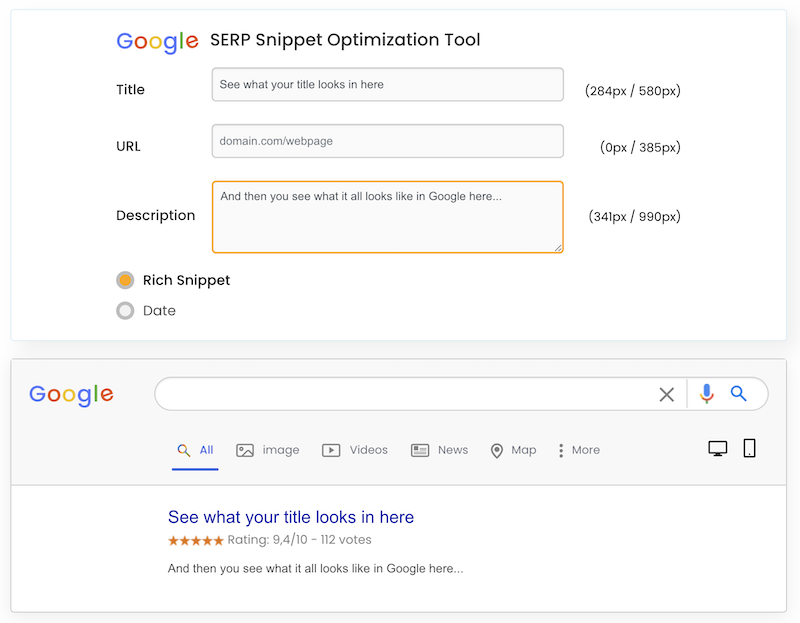
SSL/HTTPS
It looks like another confusing acronym but don't fear; they simply refer to the security of your page.
SSL stands for Secure Sockets Layer and enabling it will provide a layer of protection between your web server and your visitor's web server, keeping all your information safe and secure.
Here's what it should look like in your browser toolbar:
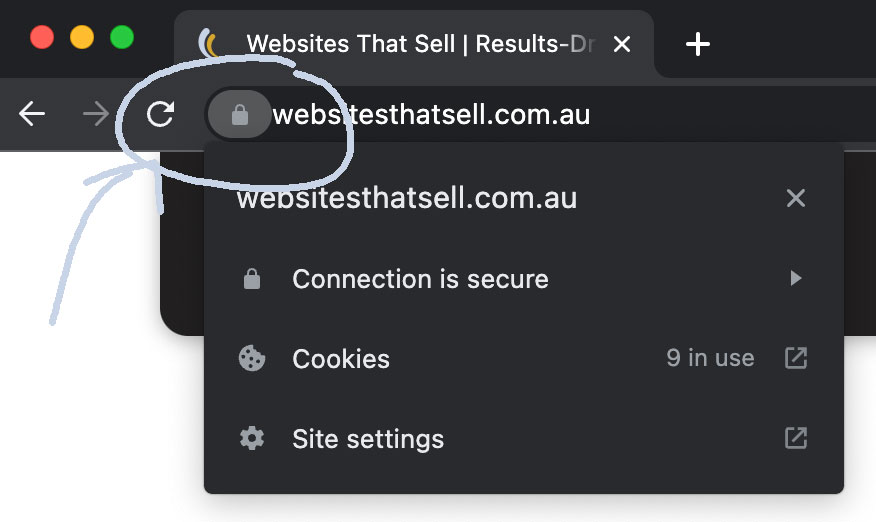
That little lock symbol and assurance that the site is 'secure' will make the Google search engine drive more traffic to your site and go a long way in improving your site's authority.
Alt Text
Search engines can't see images (poor things), so they need text on those images to understand what they are.
When you're in the world of SEO, you want every aspect of your site to be attractive and optimised.
If the search engine doesn't think you have images because you've skipped the alt text, you may lose a point for content quality (and remember - content is King!).
URL Structure
A well-organised URL structure will allow search engines to navigate your website easily and make it more user-friendly overall.
Here's a super simple illustration of what this looks like:
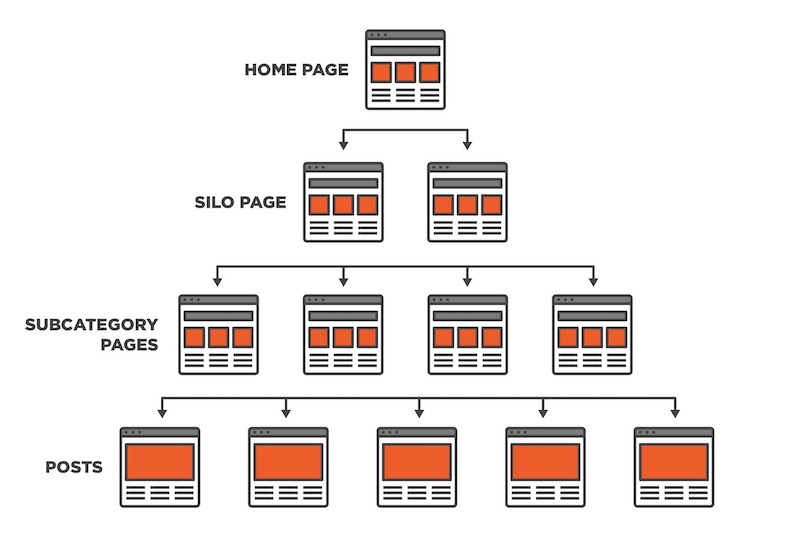
Well optimised URLs contain keywords relating to the content while being short and sweet.
Internal Links
Internal linking on your website links the page you are on to other relevant pages on your site.
It can keep visitors engaged and make it easier for search engines to examine your entire website.
Breadcrumb Navigation
Breadcrumb navigation isn't a Hansel and Gretel style of fairy-tale search.
Breadcrumbs in a website context are navigational aids that give Google information about the structure of your website and keeps your users from getting lost among all the pages of your site.
When you see this kind of thing online:
Home > News > Previous Page > Shop All
These are breadcrumbs in action to help users find their way home.
Page Speed & Performance
Nobody likes a slow website.
Apart from being annoying, a slow or poorly performing page can cause users to leave, increasing the bounce rate of your site, which search engines see as a big no-no.
People are more impatient with the internet than ever (remember when you had to turn the internet on and wait hours for it to dial up?!), and factors such as file sizes, mobile responsiveness and a minimised amount of JavaScript will go a long way in keeping things speedy.
We use a variety of tools in-house and it's always best to test things locally... but that's a complicated process.
To get a top level view there's 2 tools we recommend.
Pingdom - because you can select to test from Australian servers.
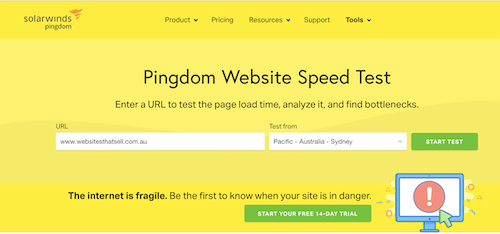
Google Page Speed Insights - the tools gives some additional insights.
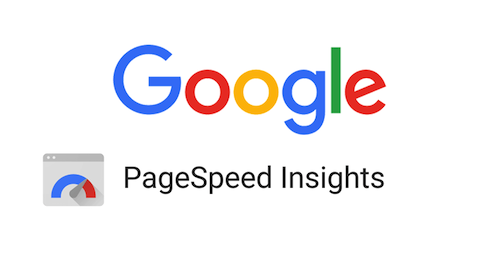
Mobile Friendliness
Mobile phones are responsible for over half of a website's total visits per year.
People are constantly searching for ideas and information, and a mobile-friendly website is essential for any modern online business. Something as simple as writing that is too small or images that don't fit properly on the screen can be enough to send your users running.
Considering your mobile user experience is not just an essential on-page SEO element; it's good marketing in action.
Schema Markup
Schema markups provide search engine results pages with snippets of information to help both Google and the user understand the page's content.
You'd likely recognise schema markups as a recipe with ratings, FAQs, an image carousel of products or images of events at the top of your Google search.
There are various ways to add this data to your website, but it's best to get a professional involved who can create your unique code for optimum results.
If you are feeling like a DIY guide you can read more about Schema Mark up here.
Core Web Vitals
User experience is so essential to a website's success that Google released a report of the standard set of signals they deem essential to all users' web experiences.
This included core web vitals such as visual stability, interactivity, and load time, along with various other tips and tricks.
Get a deep explanation of Core Web Vitals here.
SIDENOTE: we cover all of the above on-page and technical factors in our website SEO audit service.
Off-Page SEO
Where on-page SEO refers to everything ON your website, off-page SEO refers to the factors that influence your ranking that isn't on your website. This can include links from other sites and promotion methods such as social media and other forms of exposure across the world wide web.
Fundamentally, off-page SEO refers to your website's increased authority, which is usually best achieved by adding links from other websites (also known as backlinks).
The more links to your website you have, the more it looks like people rely on your information, giving it authority in Google's eyes.
Google values reliable information, so more backlinks will usually equal a better ranking.
Think of anything you've ever Googled.
What's the first thing that pops up the majority of the time?
Wikipedia.
No - Wikipedia hasn't invested in any SEO campaigns, strategies, or tactics.
As polarising as it is, Wikipedia just has so many links that its pages end up at the top of the search results with no effort at all.
Wikipedia ranks for the term "search engine optimisation' without any effort.
Link building is the biggest off-page factor for SEO.
You can attack link building in several ways, but high-quality links are sharable, genuine, and organically acquired.
Off-Page Tools For SEO:
Brand Building
Any good business plan begins with branding, and Google knows it.
Branding will build your online authority and ranking factors, encouraging brand searches and solidifying your credibility.
You may even find your business earning backlinks on other pages without needing to lift a finger.
Here's what it looks like if Google knows you're a brand:
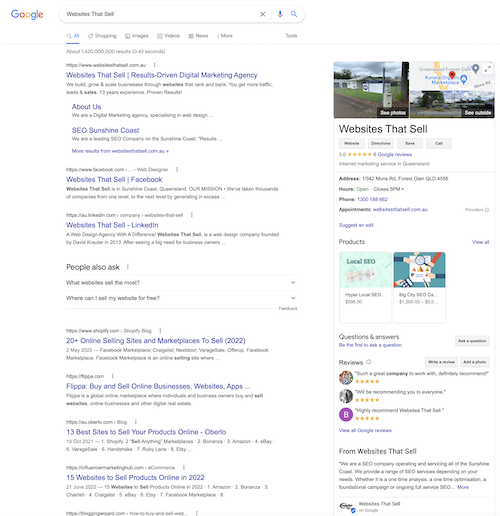
Test your own business name to see if Google recognises it as a brand.
Content Marketing
Yep, we're bringing up content AGAIN (all hail the King); however, it's important to mention that it's not only an on-page SEO tactic.
Any content you publish outside of your website is part of your strategy, and it can go a long way toward promoting your content and getting more eyeballs on your page.
Think guest blogging, infographics, publishable surveys, and studies.
Public Relations
A great PR campaign is all about building relationships, trust, and brand image.
In the world of off-page SEO, this is one way to encourage building links. If you establish your brand as an industry leader, people will look to you for authoritative information and link to you to share it around.
Trust is essential for links. No one wants their website linked to a dodgy business.
Social Media
Social media is virtually a search engine of its own!
Don't worry - your social media following, likes, or popularity does not directly affect your SEO ranking, but it is all content that can point people in your direction and get them searching your name.
Google My Business
If you don't use Google My Business and are looking at off-page SEO - stop what you are doing and set up your account now. A GMB account feeds Google the information about your business without making it search.
A GMB account tells Google (and the people who search you on Google) information like your location, operating hours, and contact details.
Domain Authority
Domain authority is another ranking system that gives you a score out of 100 based on the strength of your website. It basically tells Google whether you're reliable and if your website is technically sound.
Things that influence your domain authority include your history and how long you've had your domain name, backlinks and how many 404 pages you have.
If your brain just started spinning at the sound of another ranking system - don't worry. If you've got a well-built website and are following other SEO best practices, your score should be pretty sound.
Local Reviews and Listings
If your product or service is linked to a geographic area, remember that people will be searching for you WITH the geographic words. For example, people won't just search 'hairdresser'; they will search 'hairdresser near (insert suburb name here)'.
Local review sites and listings like Yelp, Yellow Pages and Google My Business will reference your business in your local area and help Google know to show you for searches in that area.
And, if you're not in an area, there's no point in showing up on that search engine results page anyway!
PPC
When looking at off-page SEO, it may seem odd to talk about PPC (Pay Per Click).
PPC campaigns are usually promoted as the alternative to SEO and vice versa. A good marketing campaign, however, will utilise the best of both for a fully rounded marketing mix.
PPC can support off-page SEO efforts, and off-page SEO can support your PPC campaigns.
For example, you can use PPC to promote the high-quality content that you've created with the intention of link building. The PPC campaign can put the content in front of the people most likely to link their website and pages to it to build your authority and backlinks.
Which One Should I Prioritise?
It should never be an 'either' 'or' situation when it comes to on-page and off-page SEO. It's like choosing between the tyres or petrol in your car – your business needs both to work.
It can be frustrating because there is no set formula for success. We wish it were that simple!
A lot of testing, trialling, and editing is involved in finding the right method for successful SEO, and it changes from website to website (and sometimes even day by day).
For example, the on-page SEO features that make one website fast track to success may not work for another, and the off-page SEO factors that skyrocket sales for another may make little difference to you.
As a rule, and best practice, however, if you are just starting out in SEO, we recommend focussing on the on-page SEO fundamentals, setting your site and content up well, and leaving it to organically grow off-page SEO links and elements until you have the time and understanding to tackle those as well.
KICK START YOUR
ON-PAGE & OFF-PAGE SEO
We said earlier that you don't NEED an SEO engineer to get ranked on Google- but boy does it make it easier!
Imagine searching for a needle in a haystack and then having someone with a metal detector come alongside to help you. Suddenly a long, painful task becomes quicker and easier, and you know you're going to find what you're looking for at the end of the day.
That's what we do for our SEO clients.
There may not be an exact formula for SEO success, but we know SEO so well that it is usually pretty obvious to us which on-page and off-page factors to focus on to get results fast.
Contact us today or call our office on 1300 974 367 if you're ready to get the experts involved to take over your on-page and off-page SEO.
We specialise in SEO that doesn't just get rankings - it gets results.
Learn more about our SEO services here.
We also have our main SEO office on the Sunshine Coast and satellite offices offering SEO support in Brisbane and SEO for companies on the Gold Coast.


